We’ve been closely watching and monitoring information and studies in regard to dietary DCM in dogs. DCM is a deadly heart condition that often results in the sudden and unexplained death of otherwise ‘healthy’ looking dogs. This condition is often seen in relation to feeding grain-free or boutique dog kibbles.
A new DCM dog food study came out this week (December 2022) and the results are unfortunately concerning.
We are now several studies on nutritional DCM, and every single one has shown this same correlation: certain diets are causing heart disease in dogs.
If you have a dog and are trying to find the healthiest and safest dog food to feed them, you need to read this update.
Before we dig into the nitty gritty of this study, I will summarize the results with a quote directly from the abstract:
“Healthy dogs eating nontraditional diets had lower indices of systolic function and larger left ventricular volumes compared to dogs eating traditional diets. Screening of apparently healthy dogs eating nontraditional diets might allow for early detection of diet-associated DCM.”
In other words; dogs fed certain diets had alarming changes to their heart muscle. Whether we want to hear it or not, there are dog foods on the market that are causing heart disease in dogs, and you may be feeding one of them!
The results of this study were published in the Journal of Veterinary Internal Medicine and can be viewed HERE.
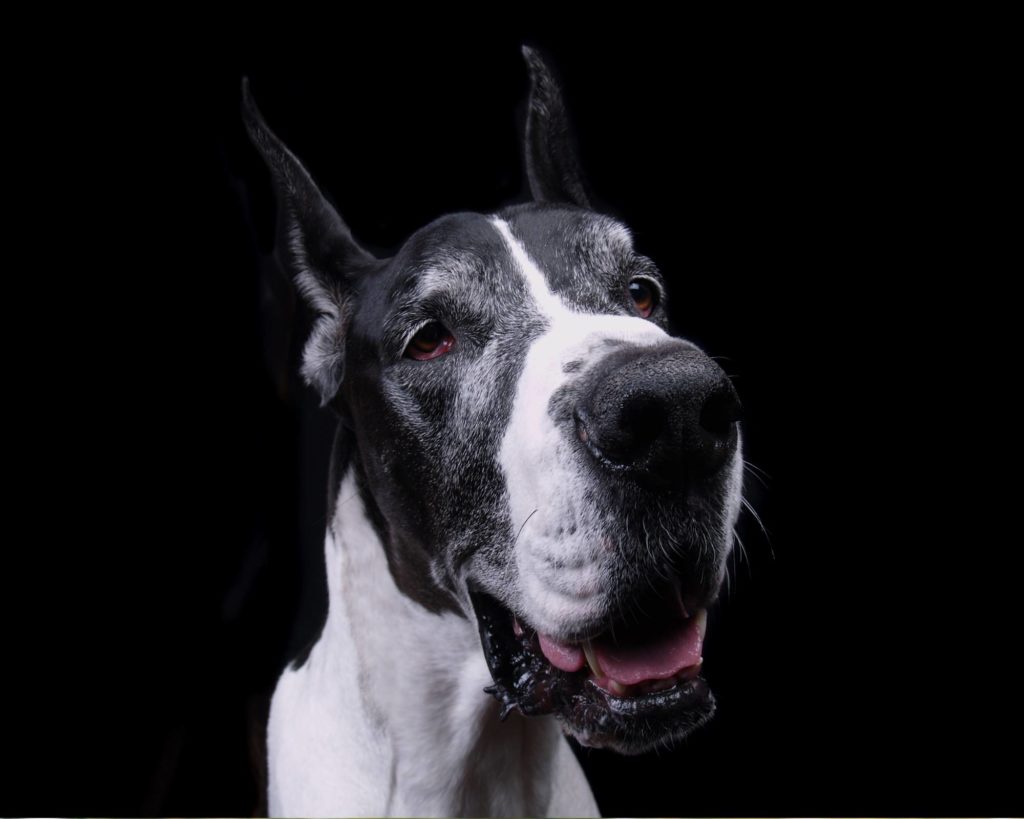
Defining the ‘Non-Traditional’ Dog Food Diet
To better understand this study, we have to define what a non-traditional dog food diet is.
“Nontraditional diets were defined as those that contained pulse ingredients as main ingredients”
Pulse ingredients may include:
- Peas
- Garbanzo beans/chickpeas
- Lentils
- Potatoes
- Sweet potatoes
- Beans
Here is an example of an ingredient list with a lot of non-traditional ingredients, including lentils, pinto beans, peas, navy beans, and chickpeas.

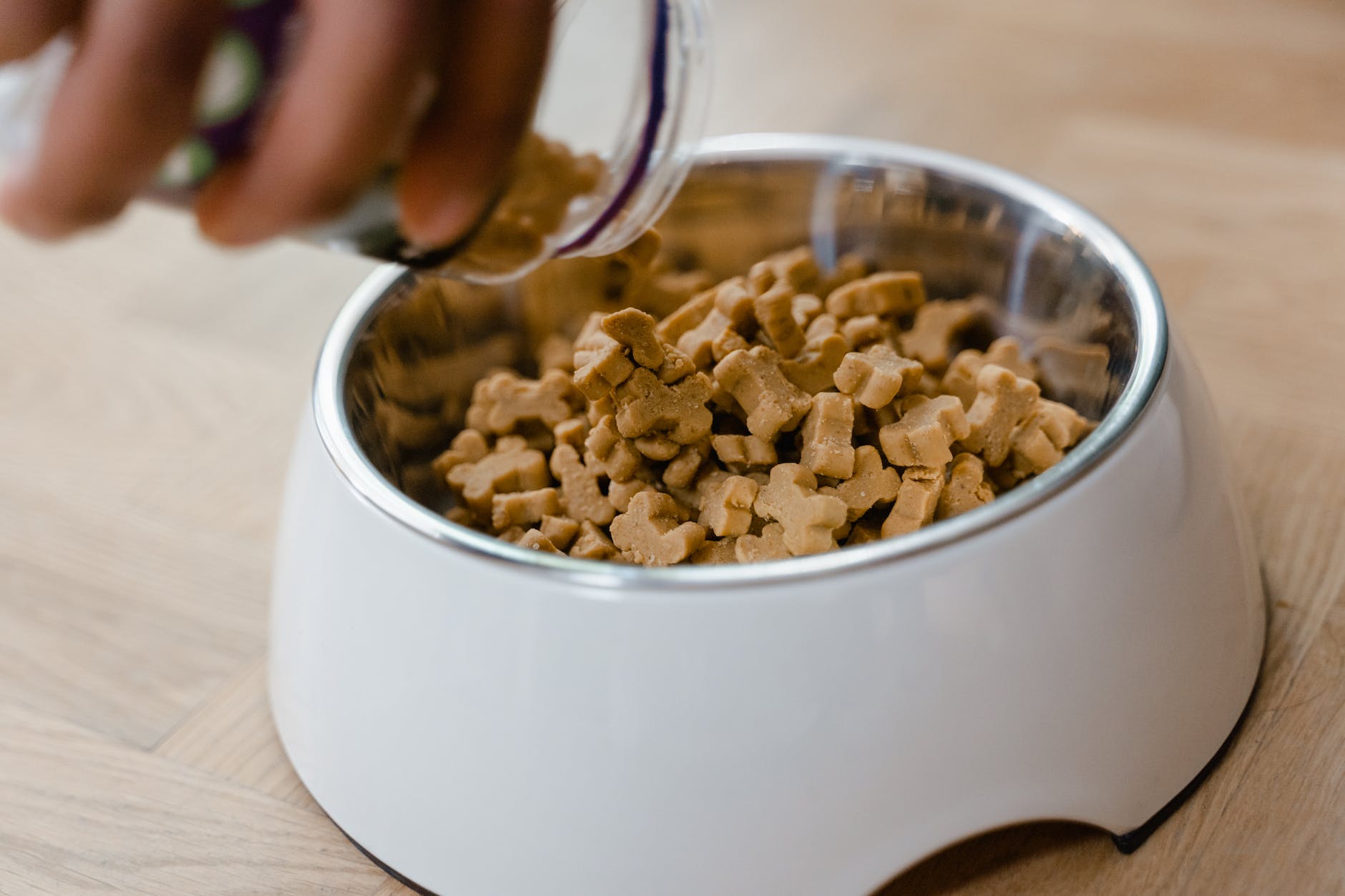
Dietary DCM in Dogs Study Details
For this study, they recruited 46 healthy adult dogs over the age of 3.
They did not use dogs with a known genetic link to DCM such as Great Danes, Boxers, Doberman Pinschers, Irish Wolfhounds, Newfoundlands, or Portuguese Water Dogs.
All 46 dogs chosen were determined to be healthy at the onset of the study. Dogs that were not chosen were excluded for a number of reasons, including existing heart issues and other health conditions. Those receiving medications or taurine supplements were also excluded.
This means that at the beginning of the study, all 46 dogs had normal, healthy hearts.
They tried to match breeds between the two groups.
For example, if a Viszla was in the non-traditional diet group, they tried to place a Viszla in the traditional diet group as well.
90% of the food that the dogs ate had to be provided by a single dry-extruded food, and the dog’s diets and the ingredients in them were well documented.
This study shows that many efforts were made to ensure a clean, accurate, fair, and informational result. It’s important to note that there are ethical dilemmas associated with studying something that, based on current knowledge, could potentially harm one of the groups in the study.
That makes dietary DCM difficult to study, because more and more evidence is showing an alarming correlation (note: likely causation). We also have to take note of the fact that studying something like this takes years! Each study can really only look at one small factor.
At least 12 studies to date have shown that this is happening; nutritional DCM is real. It is not a scam cooked up by large dog food companies.
If we are to think logically, feeding dogs diets that are heavy in peas, legumes, pulses, or potatoes isn’t going to be good for them…no matter how we spin it.

DCM Study Results: Changes in Heart Function
None of us here are veterinarians, but we can all agree that the following statement from the DCM study is alarming:
“In this study of apparently healthy dogs, those eating nontraditional diets had lower systolic function compared to those eating traditional diets using 2D and 3D echocardiographic measurements of EF, as well as GLS.”
In other words, 23 dogs who began the study with healthy, normal hearts in the “non-traditional diets” group ended the study with signs that their heart muscle and function had changed for the worse.
Many Veterinary Cardiologists and veterinarians have been alarmed and concerned about a potential link between certain dog food diets and dilated cardiomyopathy. This study along with many others (which can be seen here) are collectively building a strong and concerning case that not all dog foods are created equal.
So what makes a diet safe or not safe for your dog? Let’s dig in.

Non-Traditional Dog Food Examples
Here are some examples of the kind of non-traditional dog food brands that are similar to or identical to the foods fed in the study. Please note, that these are just a handful of examples in a dog food market with literally thousands of choices.
This is not to say that these diets below are going to hurt your dog’s heart, but we highly suggest avoiding foods like this until additional information comes out regarding dog food and nutritional DCM.
Please note that some companies use ingredient splitting to move pulse and non-traditional ingredients lower on the list. A food with peas lower on the list could still actually be very high in peas.
In general, basing your dog food choice solely on the ingredients list is not the best way to make a decision, however, in this case, the ingredients list will provide valuable information.
Note how the examples below:
- May include multiple non-traditional or pulse ingredients, not just one
- Might have ‘split’ ingredients into multiple forms (peas + pea protein + pea fiber + pea flour + pea starch)
- May or may not include added taurine. Taurine does NOT prevent nutritional DCM.
- Often present their food as “high-quality”, “holistic”, “natural”, and “free of fillers and by-products”
- Are often sold at a premium price point
NOTE: by intentionally splitting single ingredients into 2 or more parts (peas + pea protein + pea fiber + pea flour) or using multiple different pulse ingredients (lentils, peas, potatoes), food companies can make the recipe appear to be meat-focused.
Add those ingredients up, however. If you put them all together in a bowl, it’s likely they actually outweigh the meat that was included in the formula.
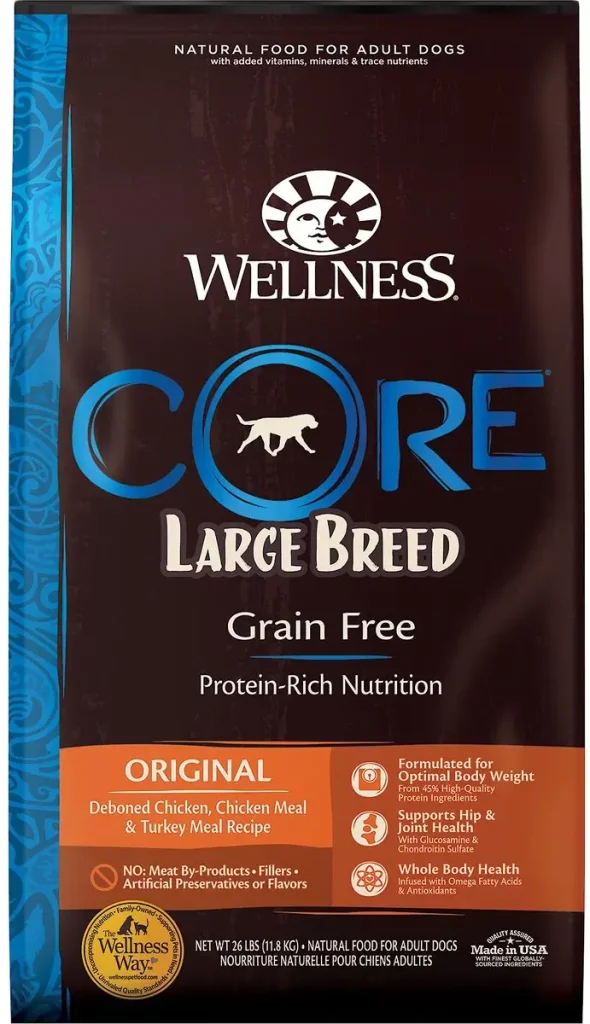
Ingredients in Wellness Core Large Breed Dog Food:
Deboned Chicken, Chicken Meal (source of Glucosamine), Turkey Meal (source of Chondroitin Sulfate), Lentils, Peas, Dried Ground Potatoes, Tomato Pomace, Ground Flaxseed, Pea Fiber, Chicken Fat (preserved with Mixed Tocopherols), Natural Chicken Flavor, Potassium Chloride, Taurine, Vitamin E Supplement, Spinach, Broccoli, Carrots, Parsley, Apples, Blueberries, Kale, Choline Chloride, L-Carnitine, Zinc Proteinate, Mixed Tocopherols added to preserve freshness, Zinc Sulfate, Calcium Carbonate, Niacin, Iron Proteinate, Ferrous Sulfate, Vitamin A Supplement, Copper Sulfate, Thiamine Mononitrate, Copper Proteinate, Manganese Proteinate, Manganese Sulfate, d-Calcium Pantothenate, Sodium Selenite, Pyridoxine Hydrochloride, Riboflavin, Biotin, Vitamin D3 Supplement, Chicory Root Extract, Yucca Schidigera Extract, Calcium Iodate, Vitamin B12 Supplement, Folic Acid, Ascorbic Acid (Vitamin C), Dried Lactobacillus plantarum Fermentation Product, Dried Enterococcus faecium Fermentation Product, Dried Lactobacillus casei Fermentation Product, Dried Lactobacillus acidophilus Fermentation Product, Rosemary Extract, Green Tea Extract, Spearmint Extract. This is a naturally preserved product.
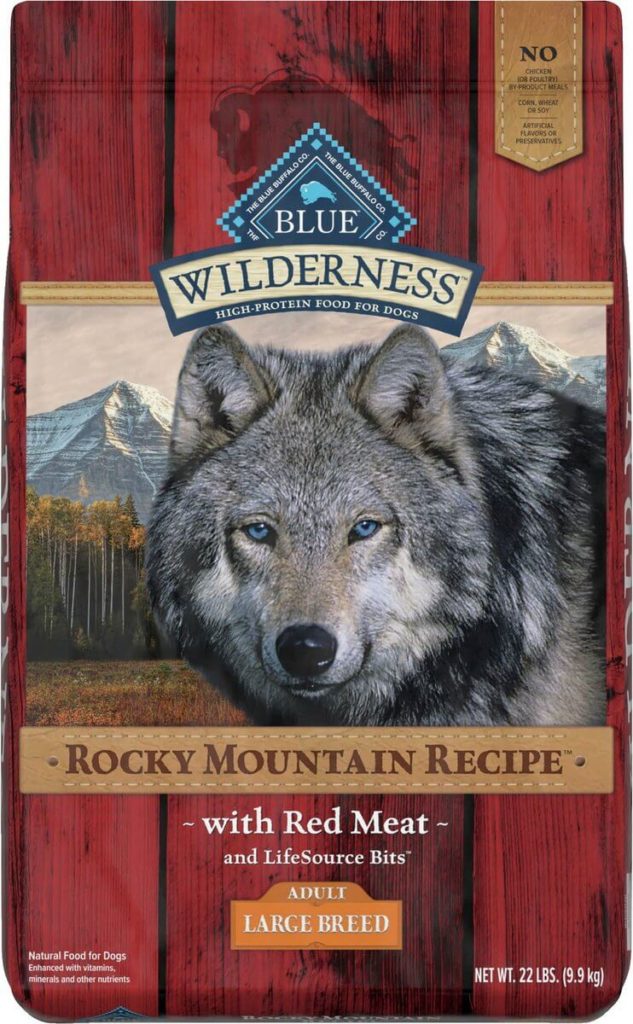
Ingredients in Blue Buffalo Large Breed Rocky Mountain Recipe
Deboned Beef, Fish Meal, Peas, Pea Starch, Tapioca Starch, Pea Protein, Beef Meal, Dried Tomato Pomace, Potatoes, Flaxseed (Source Of Omega 6 Fatty Acids), Natural Flavor, Canola Oil (Source Of Omega 3 Fatty Acids), Dried Egg Product, Fish Oil (Source Of Epa-Eicosapentaenoic Acid), Dehydrated Alfalfa Meal, Deboned Lamb, Deboned Venison, Calcium Carbonate, Dried Chicory Root, Dl-Methionine, Choline Chloride, Pea Fiber, Alfalfa Nutrient Concentrate, Taurine, Preserved With Mixed Tocopherols, Vitamin E Supplement, Sweet Potatoes, Carrots, Glucosamine Hydrochloride, Chondroitin Sulfate, L-Carnitine, Zinc Amino Acid Chelate, Zinc Sulfate, Potassium Chloride, Salt, Vegetable Juice For Color, Ferrous Sulfate, Iron Amino Acid Chelate, Blueberries, Cranberries, Barley Grass, Parsley, Turmeric, Dried Kelp, Yucca Schidigera Extract, Niacin (Vitamin B3), Calcium Pantothenate (Vitamin B5), L-Ascorbyl-2-Polyphosphate (Source Of Vitamin C), L-Lysine, Copper Sulfate, Biotin (Vitamin B7), Vitamin A Supplement, Copper Amino Acid Chelate, Manganese Sulfate, Manganese Amino Acid Chelate, Thiamine Mononitrate (Vitamin B1), Riboflavin (Vitamin B2), Vitamin D3 Supplement, Vitamin B12 Supplement, Pyridoxine Hydrochloride (Vitamin B6), Calcium Iodate, Dried Yeast, Dried Enterococcus Faecium Fermentation Product, Dried Lactobacillus Acidophilus Fermentation Product, Dried Aspergillus Niger Fermentation Extract, Dried Trichoderma Longibrachiatum Fermentation Extract, Dried Bacillus Subtilis Fermentation Extract, Folic Acid (Vitamin B9), Sodium Selenite, Oil Of Rosemary.
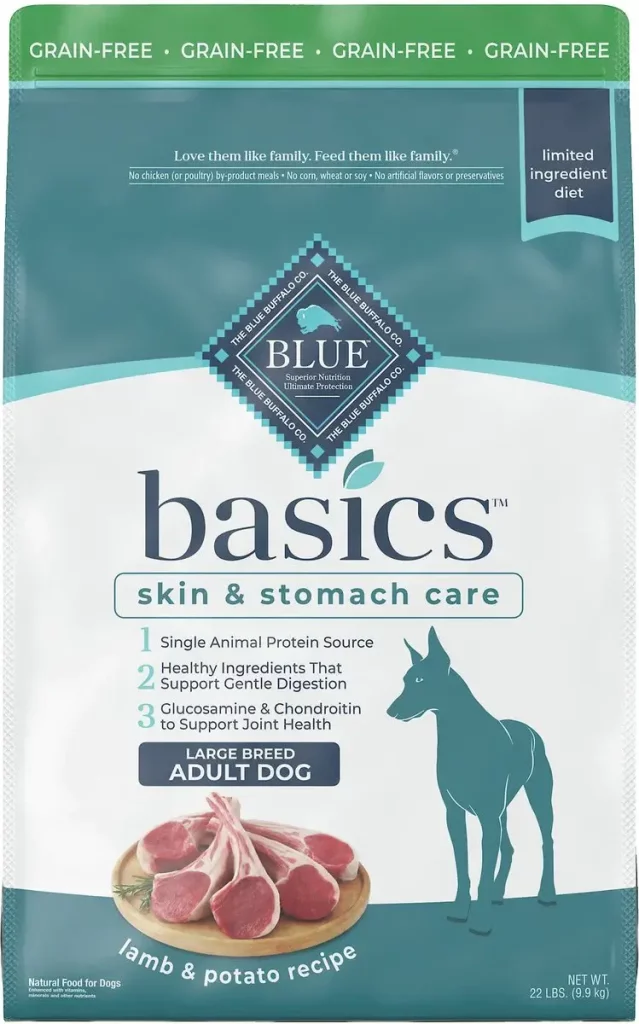
Ingredients in Blue Buffalo Basics Large Breed
Deboned Lamb, Potatoes, Pea Starch, Peas, Lamb Meal, Pea Protein, Tapioca Starch, Pea Fiber, Canola Oil (source of Omega 6 Fatty Acids), Natural Flavor, Potato Starch, Fish Oil (source of EPA-Eicosapentaenoic Acid), Direct Dehydrated Alfalfa Pellets, Choline Chloride, Pumpkin, Dried Chicory Root, Flaxseed (source of Omega 3 Fatty Acids), Alfalfa Nutrient Concentrate, DL-Methionine, Calcium Carbonate, Potassium Chloride, Taurine, Vitamin E Supplement, Salt, Preserved with Mixed Tocopherols, Glucosamine Hydrochloride, L-Ascorbyl-2-Polyphosphate (source of Vitamin C), Chondroitin Sulfate, L-Carnitine, Zinc Amino Acid Chelate, Zinc Sulfate, Vegetable juice for color, Ferrous Sulfate, Iron Amino Acid Chelate, Blueberries, Cranberries, Barley Grass, Parsley, Turmeric, Dried Kelp, Yucca Schidigera Extract, Niacin (Vitamin B3), Calcium Pantothenate (Vitamin B5), Copper Sulfate, L-Lysine, Biotin (Vitamin B7), Vitamin A Supplement, Copper Amino Acid Chelate, Manganese Sulfate, Manganese Amino Acid Chelate, Dried Yeast, Dried Enterococcus faecium fermentation product, Dried Lactobacillus acidophilus fermentation product, Dried Aspergillus niger fermentation extract, Dried Trichoderma longibrachiatum fermentation extract, Dried Bacillus subtilis fermentation extract, Thiamine Mononitrate (Vitamin B1), Riboflavin (Vitamin B2), Vitamin D3 Supplement, Vitamin B12 Supplement, Pyridoxine Hydrochloride (Vitamin B6), Calcium Iodate, Folic Acid (Vitamin B9), Sodium Selenite, Oil of Rosemary.
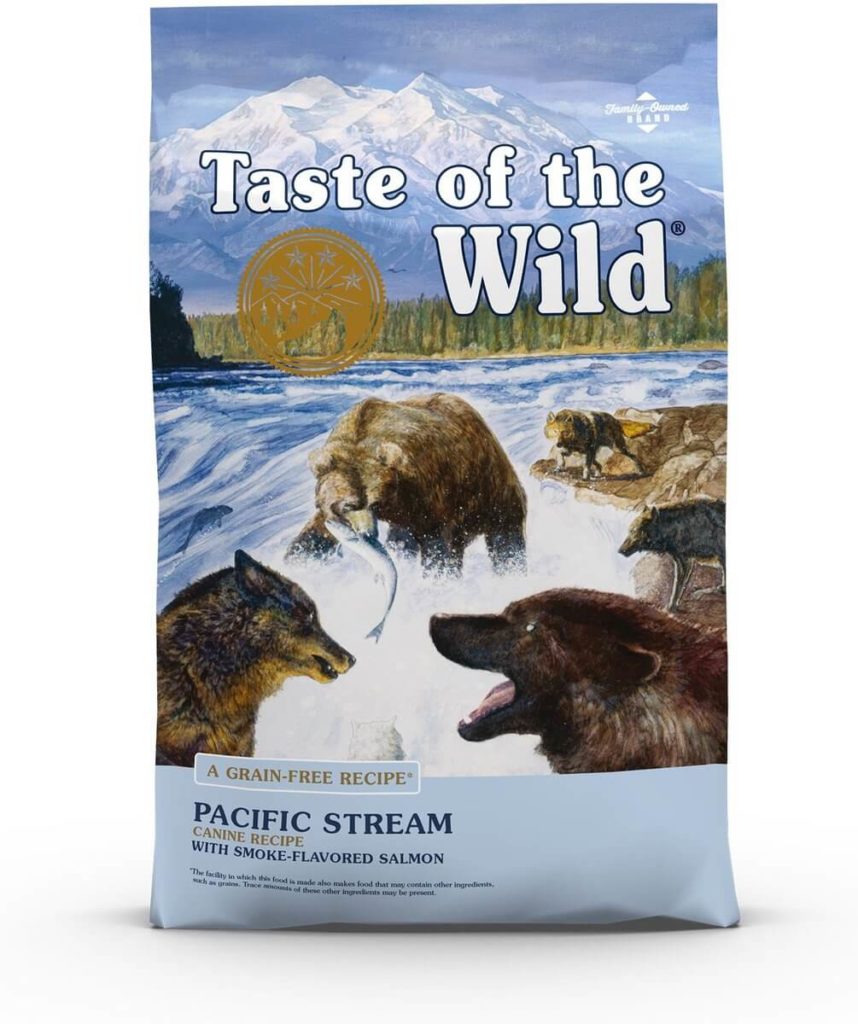
Ingredients in Taste of the Wild Pacific Stream
Salmon, Ocean Fish Meal, Sweet Potatoes, Potatoes, Peas, Canola Oil (Preserved With Mixed Tocopherols), Lentils, Salmon Meal, Smoke-Flavored Salmon, Tomato Pomace, Natural Flavor, Salt, Choline Chloride, Taurine, Dried Chicory Root, Tomatoes, Blueberries, Raspberries, Yucca Schidigera Extract, Dried Lactobacillus Plantarum Fermentation Product, Dried Bacillus Subtilis Fermentation Product, Dried Lactobacillus Acidophilus Fermentation Product, Dried Enterococcus Faecium Fermentation Product, Dried Bifidobacterium Animalis Fermentation Product, Vitamin E Supplement, Iron Proteinate, Zinc Proteinate, Copper Proteinate, Ferrous Sulfate, Zinc Sulfate, Manganese Sulfate, Copper Sulfate, Potassium Iodide, Thiamine Mononitrate, Manganese Proteinate, Ascorbic Acid, Vitamin A Supplement, Biotin, Niacin, Calcium Pantothenate, Sodium Selenite, Pyridoxine Hydrochloride, Vitamin B12 Supplement, Riboflavin, Vitamin D3 Supplement, Folic Acid.

Grain-Free Foods and DCM
Unfortunately, a large percentage of studies show a correlation between DCM and grain-free foods. This is because many grain-free diets have replaced grains with suspect ingredients such as peas, potatoes, and legumes.
However, dogs fed grain-inclusive foods are also turning up with nutritional DCM. While it’s more commonly seen in dogs fed grain-free foods, the lack of grains itself is not necessarily to blame.
This is 100% a formulation issue that is complex and likely has many factors.
This information can be scary for pet owners who, understandably, aren’t sure how to choose safe and healthy dog food for their pets!
Here is what we do know:
- A shiny coat and good stools are nice, but, it’s not an indication that the food is healthy or safe.
- Many dogs with nutritional DCM show few signs at all until one day, they have a “heart attack” and die. They may even have been ‘healthy’ just moments before their death.
- Some dogs with nutrition DCM do show signs. We’ve shared the signs of DCM in dogs below.
- IMPORTANT: adding grains or taurine to a poorly formulated diet does not prevent or treat nutritional DCM.
- Many common signs of nutritional DCM are easy to write off as ‘aging’ or ‘laziness’.
- Dogs with nutritional DCM typically have normal taurine levels.
If you have been feeding a suspect diet, in particular a diet with a lot of pulse ingredients or legumes including peas, potatoes, sweet potatoes, chickpeas, garbanzo beans, or lentils, it may be smart to see the veterinarian and request an echocardiogram. We also recommend changing your dogs diet.

What are the Signs of DCM in Dogs?
DCM is primarily a genetic disorder, and yes, Great Danes are prone to it.
That makes the nutritional aspect of DCM even more alarming: for dogs with a genetic risk, choosing the wrong diet effectively increases the chance that they may suffer from heart problems.
While many dogs with DCM (especially secondary DCM, caused by nutrition) will show no signs at all (and may even appear healthy and shiny), many others will show symptoms. These symptoms can be subtle and mistaken for other things.
Symptoms of Dilated Cardiomyopathy in Dogs
- Low energy (including being “lazy” or the assumption that it’s normal because they are “getting older”)
- Poor muscle tone, including a loss of muscle tone or even atrophy
- Anorexia and weight loss
- Intolerance to heat or exercise
- Panting
- Pale gums
- Coughing
- Irregular heart rhythm
- Weak pulse
- Distended abdomen
- Collapse
As a whole, nutritional DCM is considered “rare”. However it’s important to note that many cases of it are never officially diagnosed and documented. If an otherwise “healthy” dog dies randomly, it is most often considered to be caused by a heart attack.
These cases are not often included in nutritional DCM statistics. Most people understandably do not pay to have advanced diagnostics done on their deceased pet. Documented, verified cases of nutritional DCM have to meet certain guidelines.
(To see cases of nutritional DCM being documented in real time, as well as information regarding brands that were being fed at the time of diagnosis, visit the Diet Associated Dilated Cardiomyopathy page HERE: https://www.facebook.com/groups/1952593284998859)

What Dog Foods Do Not Cause DCM?
Because we don’t entirely yet understand why some foods cause DCM and not others (though, the picture is becoming more clear, as we’ve seen in the recent DCM study), it’s hard to say definitively whether one particular food will cause or not cause DCM.
There is one common factor that is worth noting, however.
Dogs being fed well-researched brands that have board-certified Veterinary Nutritionists formulating the diet are not turning up with Nutritional DCM.
As a matter of fact, time and time again, dogs with nutritional DCM are recovering when they are switched to a properly-formulated grain-inclusive diet.
Catching the disease early is a key element to treating N-DCM with a diet change.
What is a properly formulated, grain-inclusive diet?
It will meet the following guidelines:
- They will have at least one Board-certified veterinary nutritionist formulating the diets (ideally several of them) and they should be employed by the company – not working as consultants
- Those companies should also employ qualified staff focused on food science, toxicology, microbiology, and quality control
- Have a commitment to peer-reviewed science and research, indicating that they are advancing our understanding of veterinary medicine, nutrition, disease, growth, and health; all knowledge that can be applied to nutritional formulations
- Will do feeding trials, proving formulations and bioavailability in “real life”, not just on paper (which is the bare minimum)
- Owned facilities, not co-packed
- Strict quality-control procedures and guidelines
- Traditional formulation containing meat meal, meat by-product meal, and traditional (well-researched) grains such as rice, oats, or corn
The primary brands that check all of these boxes include:
Purina, Hill’s Science Diet, Royal Canin, Eukanuba, and Iam’s.
If you are unsure if your pet food meets these basic ethical guidelines, send them an email! Be a saavy consumer, watch for signs that they are intentionally misleading you.
For example:
- “We have a team of nutrition professionals” (Note the avoidance of the word ‘we employ’, implying that their team is likely made up of consultants who may do nothing more than check a box)
- “Our food is packed in a USDA facility” (Making a co-packing situation sound good; this company doesn’t own their facilities and has less control over the final product)
- “We do our research and feeding trials in-house” (This often means that they aren’t willing or able to have their research peer-reviewed and critiqued and thus, anything goes…including the ‘results’)
You can also check some of the stats on your food brand at the Pet Nutrition Alliance.
Additionally, here is a great video on how to choose a pet food for your dog:
Leave a Reply